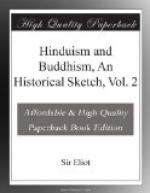on its bank, so in the heart of Tulsi Das the love
of God welled up in a mighty fountain ornamented by
the mythology and legends with which he bedecked it,
yet unaffected by them. He founded no sect, which
is one reason of his popularity, for nearly all sects
can read him with edification, and he is primarily
a poet not a theologian. But though he allows
himself a poet’s licence to state great truths
in various ways, he still enunciates a definite belief.
This is theism, connected with the name Rama.
Since in the north he is the author most esteemed
by the Vishnuites, it would be a paradox to refuse
him that designation, but his teaching is not so much
that Vishnu is the Supreme Being who becomes incarnate
in Rama, as that Rama, and more rarely Hari and Vasudeva,
are names of the All-God who manifests himself in
human form. Vishnu is mentioned as a celestial
being in the company of Brahma,[613] and so far as
any god other than Rama receives attention it is Siva,
not indeed as Rama’s equal, but as a being at
once very powerful and very devout, who acts as a
mediator or guide. “Without prayer to Siva
no one can attain to the faith which I require."[614]
“Rama is God, the totality of good, imperishable,
invisible, uncreated, incomparable, void of all change,
indivisible, whom the Veda declares that it cannot
define."[615] And yet, “He whom scripture and
philosophy have sung and whom the saints love to contemplate,
even the Lord God, he is the son of Dasarath, King
of Kosala."[616] By the power of Rama exist Brahma,
Vishnu and Siva, as also Maya, the illusion which
brings about the world. His “delusive power
is a vast fig-tree, its clustering fruit the countless
multitude of worlds, while all things animate and inanimate
are like the insects that dwell inside and think their
own particular fig the only one in existence."[617]
God has made all things: pain and pleasure, sin
and merit, saints and sinners, Brahmans and butchers,
passion and asceticism. It is the Veda that distinguishes
good and evil among them.[618] The love of God and
faith are the only road to happiness. “The
worship of Hari is real and all the world is a dream."[619]
Tulsi Das often uses the language of the Advaita philosophy
and even calls God the annihilator of duality, but
though he admits the possibility of absorption and
identification with the deity, he holds that the double
relation of a loving God and a loving soul constitutes
greater bliss. “The saint was not absorbed
into the divinity for this reason that he had already
received the gift of faith."[620] And in a similar
spirit he says, “Let those preach in their wisdom
who contemplate Thee as the supreme spirit, the uncreate,
inseparable from the universe, recognizable only by
inference and beyond the understanding; but we, O
Lord, will ever hymn the glories of thy incarnation.”
Like most Hindus he is little disposed to enquire
what is the purpose of creation, but he comes very
near to saying that God has evolved the world by the




